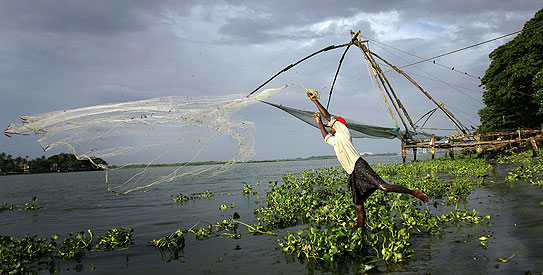
NEW DELHI: India's booming art scene is set for a new event modelled on the Venice Biennale that will feature 60 international artists by the sea in the tropical south of the country.
The Kochi-Muziris Biennale, launched this week, will be held in January next year and will be the first event of its kind in India, featuring artists from all over the world in a three-month show.
Conceived by artists Bose Krishnamachari and Riyas Komu and funded in part by the local state of Kerala, the show will make use of numerous industrial spaces in Kochi and exhibition areas in the ancient port of Muziris.
“We've always had this idea of bringing in international at into India,” Komu told AFP in a telephone interview. “We thought that a Biennale would be the best bet.” Artists working in all mediums will be invited, including several from countries with which India has poor diplomatic relations, notably neighbouring Pakistan and rival Asian powerhouse China, he said.
Young lesser-known figures with potential will be picked alongside established international names that will pull in the crowds and hopefully establish the event – and India – on the international art map.
“We'll definitely have some stars (taking part),” Komu said, adding that a list of participants would be finalised in the next six weeks. “It's important to have stars, especially for the first biennale.” Kochi, he said, was an ideal location given its physical beauty, its mixing pot of religions and its role as a cultural crossroads when it served as a centre of the spice trade around the Arabian Sea.
Arab traders and Dutch and British colonial adventurers have all left marks on the city, built on a cluster of islands, that boasts an array of old warehouses and dilapidated buildings that will be put to use by the organisers.
Muziris is an nearby ancient port city on the Malabar Coast that is being excavated by the Kerala government.
Despite the similarities in concept and the seaside locations, Komu is wary of comparing his event with Venice, which has more than 100 years of history and draws tens of thousands of people to northeast Italy every two years.
“You can't go into comparisons,” he said. “Kochi will develop its own character.”
The Indian biennale, with an initial budget of 100 million rupees ($2 million), hopes to establish itself on the international art calendar alongside Venice, the Basel art show in Switzerland or the Shanghai art fair. “It should evolve into a large major-scale project,” said Komu, a painter and photographer who was born in Kerala.
The only other international art event in India is the growing Indian Art Summit, whose third edition last month in New Delhi drew 34 foreign galleries, double the number from its previous edition.
The Art Summit has helped to raise public awareness of contemporary art, which is still very much in its infancy in India, with buyers and fans mostly restricted to the chattering classes of major cities.
Komu sees the Summit as an important commercial forum– work worth an estimated 5.4 million dollars was sold in 2009 – but Kochi will focus on artistic creation and education, rather than sales.
Overseas interest in Indian art, following a general slump in prices in 2009, is regaining momentum – albeit with a strong focus on well-established artists.
Last year, a 1983 painting, “Saurashtra” by Syed Haider Raza, sold for almost 2.4 million pounds at Christie's in London, setting a record for a modern Indian work.











































Dear visitor, the comments section is undergoing an overhaul and will return soon.